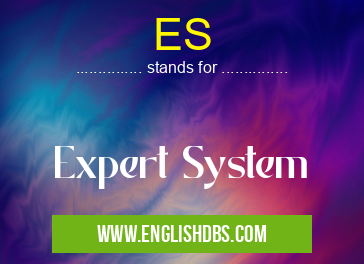What does ES mean in ELECTRONICS
An Expert System is a computer program that uses artificial intelligence (AI) technology to simulate the decision-making capabilities of a human expert. It provides intelligent solutions to complex problems in areas such as medical diagnosis, engineering design, and financial planning. It relies on knowledge derived from prior domain experience and utilizes rule-based programming and heuristic methods to arrive at accurate conclusions. By using AI algorithms, Expert Systems are able to make decisions and recommendations that would normally require the knowledge or expertise of a human being.

ES meaning in Electronics in Academic & Science
ES mostly used in an acronym Electronics in Category Academic & Science that means Expert System
Shorthand: ES,
Full Form: Expert System
For more information of "Expert System", see the section below.
Explanation
The concept behind an Expert System is based on the notion that information gathered from experts can be stored in a computerized database and then used to generate answers to specific questions or provide guidance on decisions. In order for an Expert System to be effective it must contain two main components: an inference engine which runs the expert system's reasoning process, and a knowledge base which stores the data used by the inference engine. The inference engine analyzes data from the expert system's knowledge base in order to make predictions or decisions based on existing rules and patterns. These patterns may include heuristics or decision trees which are created by AI algorithms with input from experts in the field. Once these decision criteria have been established, they are applied to new data presented by users of the system in order to provide accurate results.
Essential Questions and Answers on Expert System in "SCIENCE»ELECTRONICS"
What Is An Expert System?
An expert system is a computer application that provides advice, recommendations and solutions to complex problems based on a set of rules and heuristics designed by experts in the field. It is used to streamline decision making process by leveraging the experience of subject-matter experts.
How Does An Expert System Work?
An expert system works by using Artificial Intelligence to emulate human reasoning. It assesses a situation, reviews the available data and applies logical algorithms to identify patterns and draw conclusions. The system then produces an optimized result based on the data presented.
What Are The Benefits Of Using An Expert System?
There are several advantages to using expert systems, including improving accuracy and consistency in decisions, cost savings from automating complex processes, improved customer service capabilities, better resource utilization, increased efficiency in operations and reduced time required for decision-making.
How Is An Expert System Different From A Regular Computer Program?
An expert system is different from a regular computer program in that it uses rules, heuristics and artificial intelligence techniques which allow it to reason like a person trained in the same field would. This allows it to provide more accurate answers than what typical programs can do.
What Are Examples Of Expert Systems In Use Today?
Expert systems are used in many industries today including healthcare, finance, engineering and customer service applications. Some common examples include medical diagnosis systems, stock analysis software, robotics control systems and customer support chatbots.
Are Expert Systems Reliable?
Yes, expert systems are highly reliable when implemented correctly because they eliminate human error from decision making processes. They also enable more efficient operation of business processes as well as improved accuracy of results compared with traditional methods for accomplishing the same tasks.
Who Develops An Expert System?
Developing an expert system requires teams of specialists from various fields such as programming engineers, domain experts (in whatever area the system is representing) data scientists and AI developers who work together to create an effective product or solution.
Do Expert Systems Require Constant Updating And Maintenance?
Yes, all software applications require maintenance in order to ensure continued performance over time but because of the complexities of developing an effective solution with an expert system these types of applications often require more effort than typical applications due to their dependence on artificial intelligence algorithms.
What Are The Disadvantages Of Using An Expert System?
The most prominent disadvantage is that developing an effective expert system requires special expertise which can be costly both financially and in terms of time needed for implementation. Additionally flaws may exist if decisions cannot accurately be modeled within the specified parameters of the ruleset.
Final Words:
Expert Systems have enabled businesses and organizations to gain automated insights into complex areas where previously only humans had expertise. By combining expert knowledge with advanced AI algorithms, Expert Systems can quickly analyze huge amounts of data much more efficiently than humans could ever manage, providing powerful tools for tackling difficult problem sets. With increasing advances in AI technologies, these systems will continue to evolve becoming faster and even more efficient at solving problems in their respective fields of expertise.
ES also stands for: |
|
| All stands for ES |
